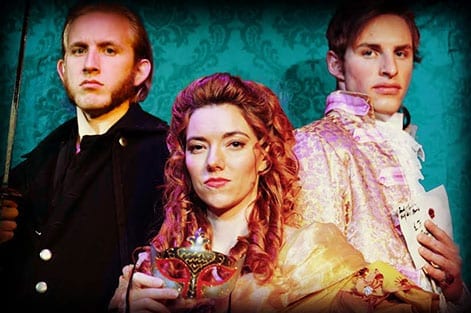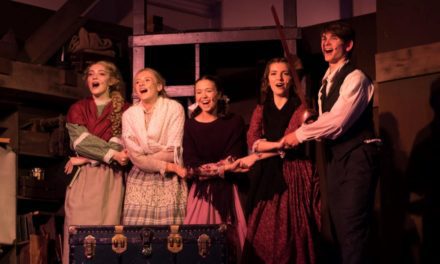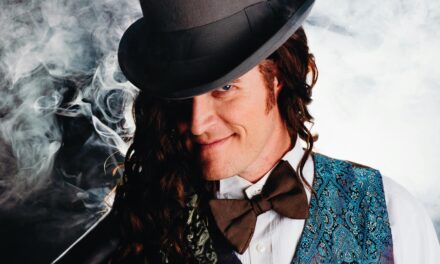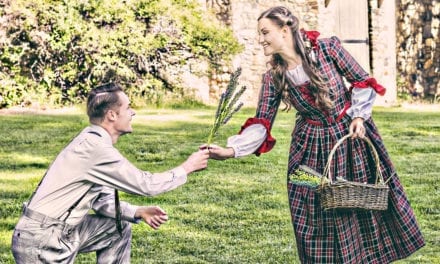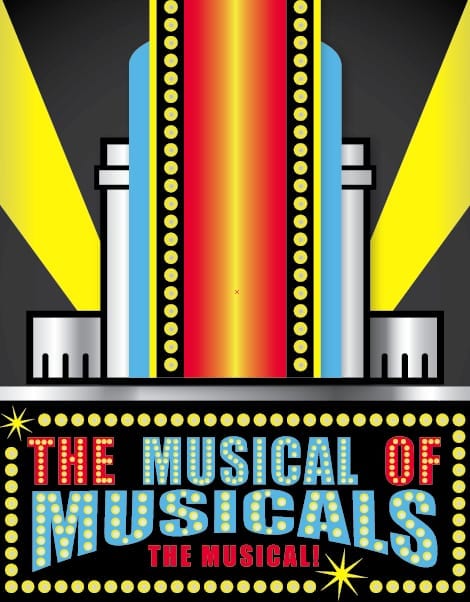WASHINGTON — The Scarlet Pimpernel, one of composer Frank Wildhorn‘s many musicals based on classic literature, delivers both comedy and romance against the dark backdrop of the French Revolution.
The theater’s pre-show announcements compared the show’s titled hero to the more modern Spider-man or Superman and his counterpart, Sir Percival Blakeney, to the characters of Peter Parker or Clark Kent who each, in order to fight for justice must obscure their true identities from even those who are closest to them. In this particular story, Blakeney is spurred toward his fight for justice when he realizes his beautiful French wife, Marguerite St. Just, may actually be a spy whose work lead to the murder of one of his friends. In order to set things right, Blakeney must pretend to be among the most elegant fops in society. Distancing himself from Marguerite, Blakeney enlists the support of his closest friends who, while in England, sport ridiculous ensembles intended to dissuade any from thinking they would have the fortitude to be the same men who, when in France, disturb the plans of the Revolution with a series of tricks.
What stood out in this particular Brigham’s Playhouse production was the depth of musical ability in both the leading actors and the ensemble. With music direction by Taylor Williams, this cast performed the intricate harmonies and frequent use of dissonance nearly flawlessly. A few of the score’s most difficult sections for the ensemble include the harmonies in the introductory number “Storybook” and the final unresolved chords in the finale rendition of “Into the Fire.” I was thrilled to hear not only accurate harmonies but a well-balanced chorus wherein the dissonant notes added color to each chord without overbearing with unpleasant force.
For smaller groups, the duet reprise of “You Are My Home” between Marguerite (Megan Rees) and her brother Armand (Taylor Williams) and the love-triangle piece “The Riddle” performed by Marguerite, Percy (Jadon Webster), and Chauvelin (Glen Reber) require the singers to sustain occasionally discordant notes with little support from the orchestration. In each case, this technically skilled cast helped Wildhorn’s acrobatic musical patterns make sense and allowed the odd combinations to contribute to the dark feel of the show. Additionally, each soloist was equally up to the score’s challenges. Reber delivered each of the powerful high notes in “Falcon in the Dive” with as much conviction as the requisite lower notes. Webster sang with an impressive range of dynamics, choosing to sing many of his most important lines in intense but quite tones.
But while I could rave about this production’s musical prowess for several more paragraphs, this production was presented as a full scale musical, not a choral concert. In other areas, it was lacking. I’d like to compare it to the theater’s physical ceiling, which was surprisingly low. So low, in fact, that I could see the ensemble shrinking back from performing to their fullest extent for fear of literally reaching the proscenium. During a scene in which Percy and the other fops don ridiculously stylish hats, Percy’s hat was actually too tall atop his head to have clearance under the curved edges of the proscenium. The physical proscenium itself was not necessarily the source of the problem. However, early choreography by Kylee Ogzewalla and Colter Christensen required the actors, dancing in pairs, to do a lift. Were it not for the low ceiling height, the lift would have been grand. Instead, it was so obviously limited as the men barely lifted the females off the ground at all.
Much of this show felt just like that lift. The talent was there, but some invisible ceiling seemed to be stopping director Jamie Young from propelling production to its full intensity. One roadblock was the choice to have Rees and Reber portray Marguerite and Armand with thick French accents. The accents seemed to require quite a bit of concentration, especially in the case of Reber as Chauvelin. Instead of coming off as sinister, Chauvelin’s lines became almost comedic. Interestingly, when the actors sang, they did so with only a slight hint of accent. Through the songs such as Marguerite’s “When I Look at You” and Chauvelin’s introduction to “Guillotine,” I was able to feel the emotions of the characters that just didn’t come through in the spoken dialogue.
Another roadblock was the complicated scene changes and effects. Although I enjoyed watching the many transformations that happened on stage through a variety of clever doors, wheels, pulleys, and even some particularly clever Velcro sails, there just seemed to always be a lot going on. I could hear the scenes changing behind closed curtains, the clanking of scenery distracting during pivotal moments. At these times, even characters without the French accent, such as Webster as Percy, seemed inhibited. In one of my favorite scenes of this production, a second act scene in which Percy tries to convince his comrades that he must continue the fight alone, the tension was practically palpable, and I finally found myself connecting to the plight of the main characters. I later realized that during this one scene, which took place in front of the curtain, the entire stage seemed to be still.
Although the musical as a whole didn’t seem to reach its potential, there were several impressive details. First, the costumes designed by Gwendolyn Dattage were as beautiful as they were numerous. I lost count of the number of intricate dresses Marguerite wore, and I was astonished by the detail in each of the fop’s costumes. One detail I appreciated was the understated allusions to a peacock, pairing the materials perfectly with the lyrics, in Percy’s costume for “The Creation of Man.” In addition, I enjoyed the intricate patterns woven in the social dances at both the wedding and the royal ball. Despite there being barely enough room for each of the dancers on the stage, I enjoyed the precision with which each dancer moved.
Finally, in contrast to those who fell just short of full commitment to their characters, Timothy Merkley and Dale Hoopes stood out as Farleigh and Elton, respectively, within the Pimpernel’s gang. I appreciated Merkley’s stoicism which came through in both his dialogue and his body language. In the aforementioned scene in which Percy attempts to dissuade his friends, Merkley sat with hunched shoulders and his head hung. The stillness he maintained spoke as loudly as any movement he made elsewhere. Hoopes had the opportunity to play Elton, for whom the character of a fop is really no stretch. I enjoyed everything from his choice of heeled shoes to his tendency to stand in a ballet position when in a state of relaxation.
When reviewing productions, it is tempting to use the ticket price as a ruler with which to measure a production. It is sometimes possible for a show with a $10 ticket to seem great because expectations were low or conversely for a show with a $30 ticket to seem disappointing because expectations were high. If I was to use such a measurement standard for this Brigham’s Playhouse production for which a ticket costs up to $23, I would have to say that it didn’t quite measure up. Despite having musical numbers that far surpassed any expectations, this production just didn’t deliver the necessary intensity of the French revolution or of love that conquered all. In this case, I would rather skip the price of the ticket and listen to the CD instead.

